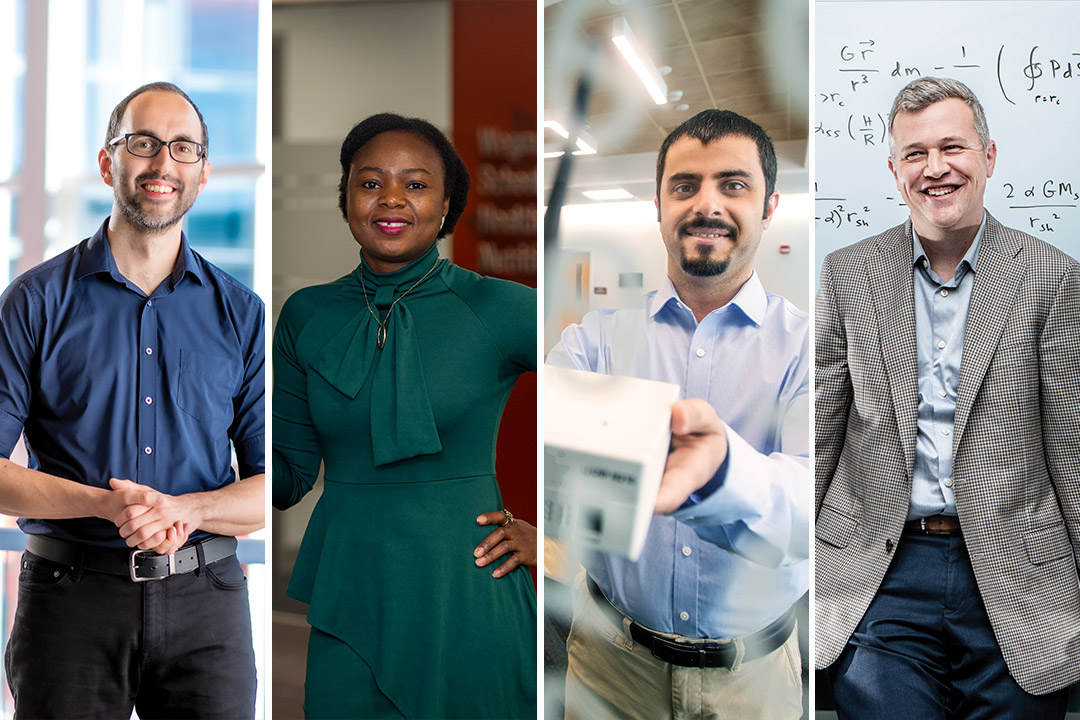Researchers work to benefit society
Anthony Jimenez, Brenda Abu, Hanif Rahbari, and Jason Nordhaus.
RIT's researchers are improving healthcare for marginalized populations, explaining mysteries of the universe, battling anemia, and making autonomous driving systems more secure. Meet four of them.
Anthony Jimenez
Jimenez is an assistant professor in the Department of Sociology and Anthropology, College of Liberal Arts
Area of Research: The impact of COVID-19 is felt by everyone, particularly healthcare practitioners working on the front lines of the pandemic. Jimenez is capturing the experiences of regional healthcare workers, with particular focus on those providing services to marginalized populations. These practitioners often receive the least stable funding sources. He hopes that sharing first-person accounts of what doctors, nurses, and other medical staff experience will spark change both in policy and in public sentiment toward these workers.
Motivation: “As a medical sociologist, I want to understand the larger social, structural, and political causes of today’s health disparities. By sharing these first-person accounts, I would like to see a social and cultural recognition among everyday folks of these practitioners’ work and why it’s important. In my mind, that’s how we begin to collectively, on a societal level, envision what change looks like. Change is possible, but it requires creativity, imagination, and courage—all of which we are all capable of.”
Brenda Abu
Abu is an assistant professor in Wegmans School of Health and Nutrition, College of Health Sciences and Technology
Area of Research: Throughout her career, Abu witnessed the devastating toll of anemia—the hidden hunger—on women and children in Ghana and in the United States. Anemia can cause severe fatigue, pregnancy complications, and stunted physical and mental development. Unchecked, it can result in heart problems, oral disease, and death.
Abu envisions a holistic approach to battling anemia that builds resilience against undernourishment and disease through access to early detection, fortified foods and agricultural products, social programs, and nutrition education and treatment.
Motivation: “With my training and expertise in nutrition, my long-term career goal is to bridge gaps in nutritional and oral health research and generate groundbreaking interventions for early warning, early detections, and prevention of oral disease and iron deficiency among underserved mothers and young children.”
Hanif Rahbari
Rahbari is an assistant professor in the Department of Cybersecurity, Golisano College of Computing and Information Sciences, and Department of Computer Engineering, Kate Gleason College of Engineering
Area of Research: Rahbari is making roadways safer by enhancing the security of connected vehicle technology for driver- assistance and autonomous driving systems. The wireless communications among connected vehicles—enabled by 5G—are vulnerable to emerging cyberattacks. Rahbari earned a National Science Foundation CAREER award to develop better security protocols and design an innovative hardware testbed that integrates real wireless transmissions with a digital twin of roadways to evaluate those protocols. His work will also protect against future quantum-related cryptography attacks, following a practical roadmap that he is developing for the next two decades of connected vehicle security.
Motivation: “These advanced driving systems have the potential to save tens of thousands of lives every year while also making driving more inclusive. If we’re going to rely on this technology to help human drivers, it needs to be secure and reliable—both today and 20 years in the future when there are old cars and new attacks. Otherwise, it could make things worse on the road. At RIT, our diverse and interdisciplinary team will play a key role in creating and realistically evaluating connected vehicle technologies. We have a chance to make the future safer, and I’m excited for that challenge.”
Jason Nordhaus
Nordhaus is an associate professor in the Department of Science and Mathematics, National Technical Institute for the Deaf
Area of Research: By unraveling the physics of neutron stars, Nordhaus is breaking through disciplinary and cultural boundaries to explain mysteries of the universe, including how the world’s heaviest elements, like gold, silver, platinum, and lead, are formed. His National Science Foundation funding will also help promising undergraduates who are deaf or hard of hearing or are of Hispanic heritage study alongside the world’s experts, building bridges to earning competitive positions in graduate programs or STEM careers.
Motivation: “We are entering a golden age for studying neutron stars. Over the next several years, neutron star mergers will be observed through gravitational waves, electromagnetic radiation, and—potentially—neutrinos, the most abundant particles that have mass in the universe. These observations will provide unparalleled opportunities to answer fundamental questions in astrophysics. With a dream team composed of the world’s experts on neutron stars, we are pursuing research avenues that will leverage this data to drive new scientific discoveries.”
